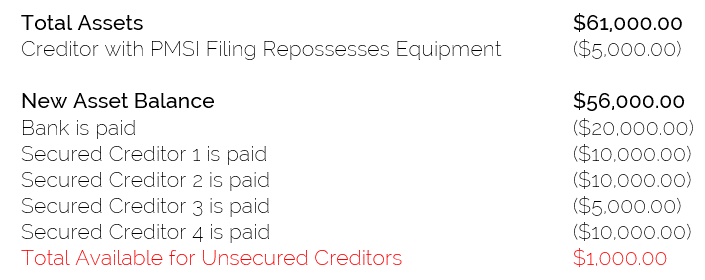The Important Role of PMSI UCC Filings in the Foodservice, Beverage & Hospitality Industries
Previously we discussed how Blanket Filings and Consignment Filings can reduce risk when supplying to the food, beverage & hospitality industries. Now let’s discuss PMSI in Inventory and PMSI in Equipment filings and their role in securing creditors.
Purchase Money Security Interest (PMSI) Filing: Inventory or Equipment
A Purchase Money Security Interest (PMSI) filing provides the same benefits as the blanket filing with the addition of priority of repossession of specific identifiable goods, primarily inventory or equipment that your company would provide.
The determination of whether your goods are inventory or equipment depends on what your customer is doing with the goods you provide.
If you sell goods to your customer and your customer intends to resell them to other entities, then your goods would be considered inventory. Within the food, beverage & hospitality industries, we don’t often see creditors using inventory filings.
Why? Well, frequently these goods are perishable and you don’t want them back.
PMSI in Inventory: “Securing collateral that is defined as inventory 9-102(48) – “Inventory” means goods, other than farm products, which: (A) are leased by a person as lessor; (B) are held by a person for sale or lease or to be furnished under a contract of service; (C) are furnished by a person under a contract of service; or (D) consist of raw materials, work in process, or materials used or consumed in a business.”
PMSI in Equipment filings are much more common in the food, beverage & hospitality industries.
PMSI in Equipment: “Securing collateral that is defined as equipment 9-102(33) – “Equipment” means goods other than inventory, farm products, or consumer goods. The “equipment” is used in the course of the debtor’s business – it is not stocked.”
Creditors who would benefit from a PMSI in Equipment would supply items like copy machines, beverage dispensing machines, flatware, ice machines, stoves/hoods and walk-in coolers; equipment your debtor would keep, use in their ordinary course of business and not re-sell. These are items that you could potentially repossess because there is a resale value to you.
(Note, if you are supplying equipment, it could be deemed a fixture, which warrants a different type of UCC filing.)
Let’s Look at an Example
As an example, a bankrupt restaurateur has six secured creditors. One of his creditors is secured via a PMSI Filing, 5 creditors are secured via Blanket filings, and the remaining creditors are unsecured.
The creditor secured via a PMSI filing has sold a piece of equipment which has been placed in Chef Charles’ restaurant. The original price of the equipment was $10,000, and over time, Chef Charles has retained possession of the equipment and paid $5,000 towards the balance, leaving a balance of $5,000 due to his creditor.
The bankruptcy trustee is going to liquidate Chef Charles’ $61,000 in assets and begin paying his creditors.
The creditor with the PMSI filing will go in first and repossess their piece of equipment. Then the total assets value is reduced from $61,000 to $56,000. Now, payment priority goes first in time, first in right.

Once the secured creditors have been paid, there is $1,000 remaining, and that $1,000 will be disbursed on a pro-rata basis to all general unsecured creditors.
Because the creditor secured their equipment through a PMSI filing, they took priority over the various Blanket filers.
The food, beverage and hospitality industries are enormous — just drive down the street and you are likely to see a dozen different restaurants in a half mile stretch. Although variety is nice as a consumer, this heavily saturated market is extremely risky for creditors.
Extending credit without security is simply a risk you cannot afford in this market — file UCCs to mitigate your risk and exposure.


